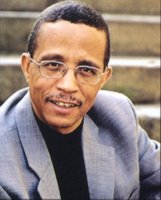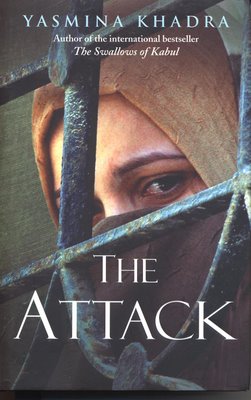

There are some well-known examples of women writing under male pseudonyms. The 19th century English novelist Mary Anne (Marion) Evans wrote under the name George Eliot, so as to be taken seriously as a novelist. Some women fiction writers today prefer to use their initials rather than their full first name to try to avoid possible discrimination against women writers.
For a male writer to use a female pseudonym is rarer. The case of the Algerian writer who writes under the name Yasmina Khadra is particularly unusual. Khadra wrote police thrillers in Algeria, and has also written a string of political novels. Eventually the author was revealed to be a former Algerian army officer Mohammed Moulessehoul (pictured above left), writing under the name of his wife.
Moulessehoul writes in French, and five of his novels have been translated into English. He moved to live in France in 2001 and it was then that he “came out” and disclosed Khadra’s real identity. For some, his background casts a permanent shadow over his writing and his agenda. There have been accusations that in his novels chronicling the war of the radicals within Algeria, he documents the atrocities perpetrated by radicals while ignoring those allegedly carried out by the Algerian army.
In 2002 the International Parliament of Writers withdrew the protection it had accorded Moulessehoul and his family, after he defended Algeria’s army against accusations that it massacred civilians.
Khadra’s novels have done well, particularly “The Swallows of Kabul”, written from the point of view of an Afghan woman suffering under the Taleban. The novel was shortlisted for the IMPAC prize.
Khadra’s latest book, “The Attack”, won the Prix des Libraires in France, and was shortlisted for the Goncourt, Femina and Renaudot prizes. In Britain, where it was published recently by William Heinemann in English translation, it has been widely, and on the whole favourably, reviewed.
In “The Attack”, Khadra continues to explore the relationship between politics, violence and religion. The first-person narrator Amin Jaafari is an Arab surgeon practising in a Jewish hospital in Israel. Despite his Bedouin origins, he has succeeded in entering “the brotherhood of the highly educated elite”.
Jaafari has been married for 10 years to Sihem, in what he considers a happy union. He is devastated when she dies in a suicide bombing in a Tel Aviv restaurant which kills 19 people including 11 schoolchildren. His grief turns to disbelief when he finds she was the suicide bomber.
Jaafari sets out to discover why Sihem did what she did, and to uncover the lies she had told him. She had told him she was going to stay at her grandmother’s farm near Nazareth, but she was actually driven to Bethlehem before returning to Tel Aviv to carry out the bombing.
Although Khadra’s writing has power and clarity, Sihem remains an obscure figure and her motivation is not wholly convincing. Her husband’s investigations take him into perilous confrontations with certain family members and radicals in Bethlehem and Jenin. At the same time he is forced to review his position as an Arab who has done well within the Israeli medial establishment. One of the men he meets in the West Bank describes him as the “serviceable Arab par excellence” Driven to the edge of madness, Jaafari finds he is suspected by both Israelis and Palestinians.
Susannah Tarbush
Saudi Gazette August 8 2006


No comments:
Post a Comment